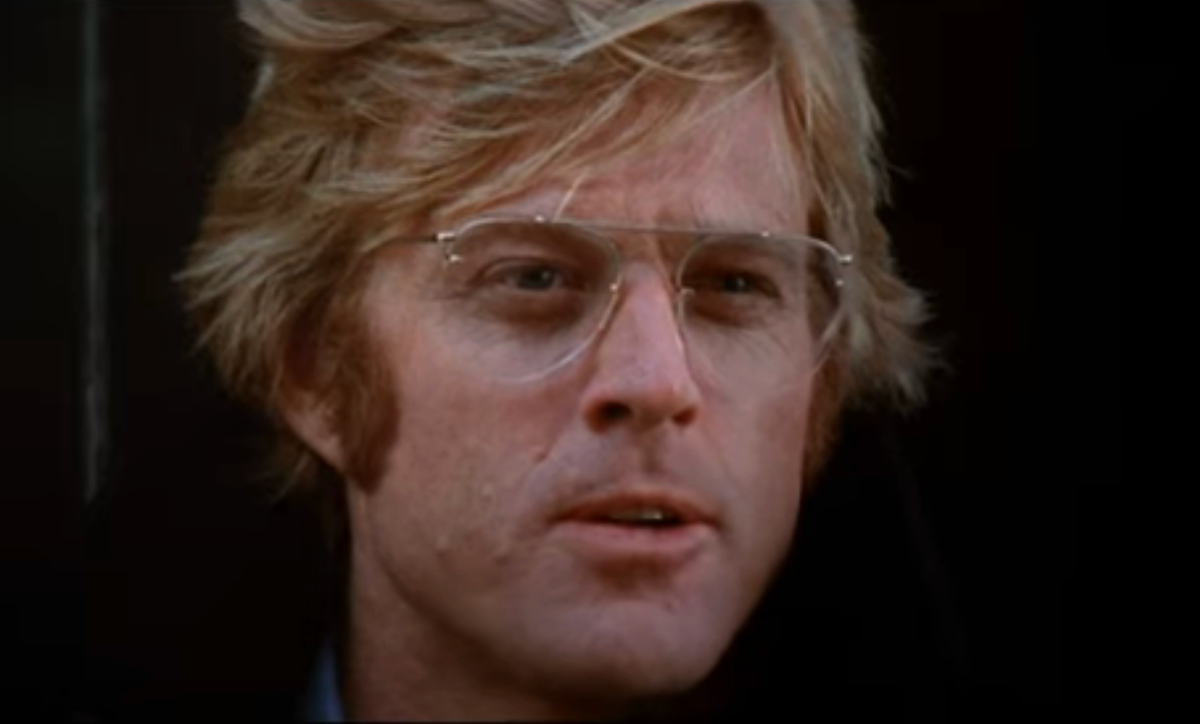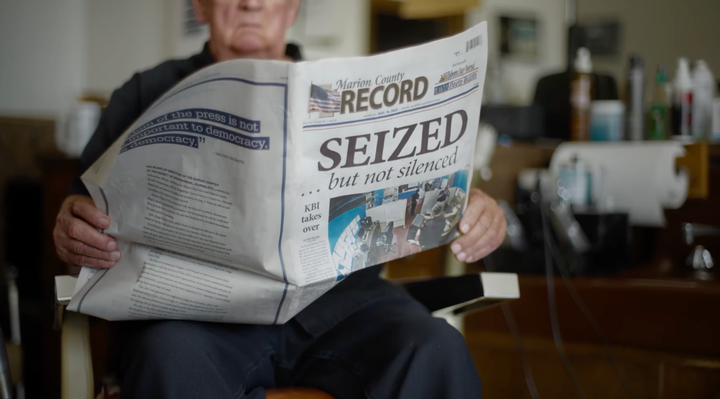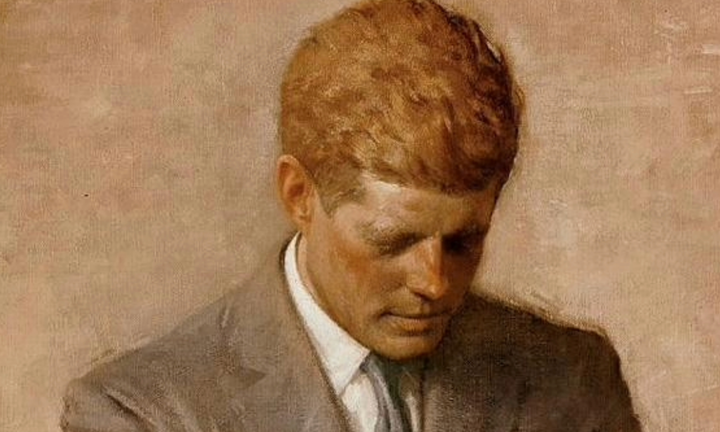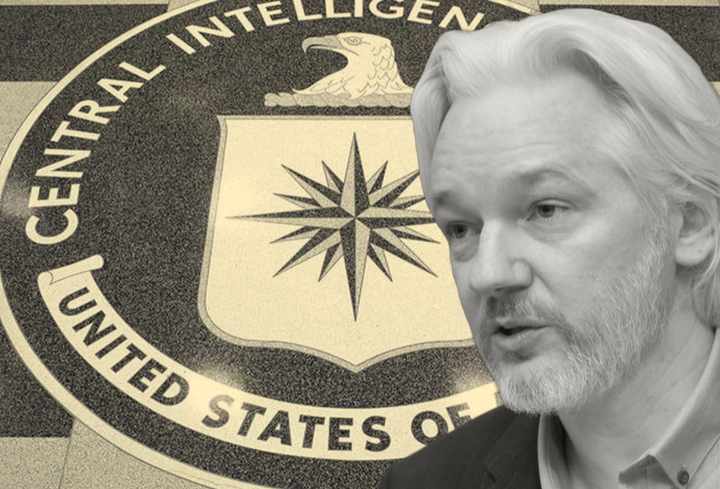‘Three Days of the Condor’ At 50: A Classic Conspiracy Thriller And Whistleblower Film
Moviegoers in the United States were primed for a film like “Three Days of the Condor" when it was released in 1975.

The following was originally published on February 25, 2023. It has been edited and updated for the film's 50th anniversary.
By September 25, 1975, when “Three Days of the Condor” was released, the Central Intelligence Agency (CIA) had been exposed for spying on thousands of antiwar and Black liberation activists.
The CIA had been implicated in the coup in Chile that resulted in the assassination of socialist President Salvador Allende. CIA plots to murder Congo President Patrice Lumumba, Dominican Republic President Rafael Trujillo, and Cuban President Fidel Castro were revealed two months later.
Senator Frank Church, who chaired the intelligence committee investigation into the CIA, described covert action as a “semantic disguise for murder, coercion, blackmail, bribery, the spreading of lies, whatever [was] deemed useful to bending other countries to [America’s] will.”
Moviegoers in the United States were primed for a film like “Condor,” which depicted the CIA as the lawless and unaccountable agency that was the subject of explosive Church Committee hearings on Capitol Hill.
In fact, “Condor” holds the distinction of being the first Hollywood thriller to focus solely on the CIA. The film also contains a sensational whistleblower narrative that starkly portrays how far officials in the national security state will go to keep their shadowy operations hidden from the public.
The film was directed by Sydney Pollack and starred Robert Redford, Faye Dunaway, Cliff Robertson, and Max Von Sydow. Dino De Laurentiis, who previously produced “Serpico” (1973) helped make “Condor,” and the script was loosely based on James Grady’s novel “Six Days of the Condor.”
Joe Turner (Redford) is a researcher for the American Literary Historical Society, a CIA front. As he tells Kathy (Dunaway), “We read everything that’s published in the world, and we feed the plots, dirty tricks, codes—into a computer, and the computer checks against actual CIA plans and operations. I look for leaks. I look for new ideas. We read adventures and novels and journals.”
Turner returns from picking up lunch for his colleagues to find that they have all been assassinated. It does not take long for Turner to realize he cannot trust anyone at the CIA. The fear for his survival transforms him into a whistleblower.
When Turner makes a call from a phone booth and informs his chain of command of what happened, the Major (Jess Osuna), who mans a call center, scolds him. Officials find fault in how he used an unauthorized exit to go get lunch. They instruct Turner to not come to CIA headquarters and stay out in the cold because they need to develop a plan to eliminate him.
“I’m not a field agent. I just read books,” Turner informs the Major, an admission that the mess in which he finds himself entangled is way above his pay grade.
Turner had faith in the agency, but like most whistleblowers, he cannot understand why the CIA is calling out his “mistakes” and will not immediately help him after this incomprehensible tragedy.
'More Interesting Than Just Another of Our Reader/Researchers'

Following the assassination of Turner’s colleagues, Mr. Wabash (John Houseman), who occupies some kind of senior CIA role, icily lays out how the CIA might discredit or neutralize Turner. Houseman brings a kind of Hitchcockian presence to the film.
“I don’t expect too many mistakes from this man, though he does seem rather more interesting than just another of our reader/researchers,” generalizes Wabash. “For example, has he gone into business for himself? Was he turned around? Does someone operate him?”
“Homosexual? Broke? Vulnerable? Could he be a soldier of fortune?” Wabash adds. “Did he arrange the hit? Is that why he’s still in the fight?”
All of the above are attacks that could be leveled at Turner to discredit him if he speaks to the news media or members of Congress.
Perhaps, Wabash is in on the conspiracy within the CIA. Yet given how the film was produced and released as the infamous “Family Jewels” revelations were exposed by journalist Seymour Hersh, it is also possible that Wabash is concerned with how the agency will protect itself from another scandal.
Driving into New York, Turner wonders, “Is there an intelligence network undetected by the CIA, linking certain Arabic-speaking countries with Dutch and Spanish-speaking?” All he did was file a report with his section chief. He is still working through everything he remembers in order to make sense of what is happening.
How Kathy (Dunaway) enters the story is unpleasant, though Turner needs an ally. Turner abducts her at gunpoint and orders her to take him to her home. She believes she is going to be raped, and Turner’s actions only give her more reason to be terrified.
Kathy accepts that Turner’s life is in danger, but all this talk about the CIA coming after him is preposterous to her. As the first non-CIA person who Turner tries to inform about the murder of his colleagues, she effectively represents the general public. If Turner cannot persuade her that he has stumbled upon a CIA conspiracy, then how does he survive?
Joubert, played by Sydow, is a menacing but debonair assassin-for-hire. “Someone’s always willing to pay the price,” Joubert tells Turner.
Joubert does not play sides. He works for the CIA, and then later is hired by an underground network of spies—within the CIA. He cares little about allegiance or loyalty. The agency can turn on Joubert just as quick as anyone else, something Turner recognizes when Joubert shows up to kill Leonard Atwood, the CIA deputy director of operations for the Middle East who authorized the assassination of Turner and his colleagues.
Through interactions with Higgins (Robertson), a CIA deputy director in New York, Turner’s transformation into a whistleblower becomes even more apparent. Higgins represents the company man who is enamored by the cult of intelligence and cannot bring himself to walk away, no matter what lawlessness occurs. (He also is poor at operational security. Turner abducts him multiple times.)
Turner earnestly tries to bring Higgins over to his side. “I pick up traces of an intelligence network that the company doesn’t know about, and I report it,” Turner recalls. “Now why is that gonna make anybody mad, Higgins? Unless it was the company’s network.” All Higgins can say to Turner is, “I’m sorry,” as his colleagues hunt the man who knows the truth.
'Don’t You Know Where We Are?'

In the film’s final sequence, CIA operatives surround Turner. He escorts Higgins at gunpoint. Turner has found all the puzzle pieces and knows the CIA network he stumbled upon was assembled to help the U.S. government steal oil from the Middle East.
“Do we have plans to invade the Middle East?” Turner asks. Higgins replies, “We have games. That’s all. We play games. ‘What if?’ ‘How many men?’ ‘What would it take?’ Is there a cheaper way to destabilize a regime?’ That’s what we’re paid to do.”
Higgins claims that Atwood was engaged in a “renegade operation,” and that his off-the-books assassination network would never have been approved, particularly with “all the heat on the company.” This may be a reference to the unprecedented scrutiny, which the CIA was under from the press and Congress in the 1970s.
Turner continues, “Suppose there’d been no heat? And I hadn’t stumbled on the plan? Nobody had?”
“Different ballgame. The fact is, it wasn’t a bad plan. It could’ve worked,” Higgins asserts.
Turner is offended, “Jesus, what is it with you people? You think not getting caught in a lie is the same as telling the truth.”
“It’s simple economics, Turner,” Higgins contends. “There’s no argument. Oil now; 10 or 15 years, it’ll be food or plutonium. Maybe sooner than that. What do you think the people will want us to do then?”
Higgins reasons that what Turner opposes is necessary to sustain America’s capitalist dominance in the world. The CIA plays a critical role in maintaining an order that provides U.S. citizens a lower cost of living than the populations of other countries.
“When it’s cold at home and the engines stop and people who aren’t used to hunger go hungry, they won’t want us to ask,” Higgins proclaims. “They’ll want us to get it for them.”
Hearing Higgins defend the ruthlessness of U.S. colonialism, Turner calls out Higgins for suggesting Atwood might be an exception to the rule. He was not a rogue. Atwood was Higgins. He was every CIA man.
“Don’t you know where we are?” Turner asks. Higgins spots the newspaper trucks. The camera tilts upward, revealing the logo for The New York Times emblazoned on the building.

Turner went to the press, and he’s extremely confident that he’s won. “It’s been done. They have it.”
“You’ve done more damage than you know,” Higgins warns, and Turner retorts, “I hope so.”
Nearly every crime the CIA or any other U.S. intelligence agency has committed has been met with claims that the truth has damaged “national security.” Turner is proud that his whistleblowing might make it impossible or difficult for the agency to operate another secret network of assassins, who are unaccountable to anyone in the government.
Finally, Higgins calls out, “Turner! How do you know they’ll print it?” Turner walks away, and Higgins asks again. Turner stops. “They’ll print it.” A shot of Turner’s face in a crowded New York street freezes.
If Turner is right, he may survive. If he is wrong, he will be assassinated very soon.
It is left to interpretation whether the Times published the revelations from Turner.
Turner was a single source. Without any other source willing to corroborate his claims that a secret unaccountable network of assassins murdered his section and tried to kill him, the Times would not print it. Or the outlet would print it, along with a denial from the CIA that could leave Turner vulnerable to a criminal prosecution. (Seymour Hersh was actually still working for the newspaper when the film was released.)
'The CIA Is Simply A Tool'

Former Director of Central Intelligence Richard Helms was photographed on the set with Redford after returning from Tehran. At the time, the former CIA director was the U.S. ambassador to Iran. Helms was also trying to defend the agency from several congressional investigations that implicated him.
Helms was responsible for CIA agents and assets who infiltrated antiwar groups in the United States. He fulfilled President Richard Nixon’s order to “make the economy scream” in Chile after socialist Salvador Allende was elected. The CIA director’s fingerprints were all over the coup that led to Allende’s assassination.
After Helms testified before the Rockefeller commission, which was convened in response to allegations against the CIA, he shouted, “Killer Schorr! Killer Schorr!” at CBS reporter Daniel Schorr. Helms was angry that Schorr had called attention to CIA assassination plots against foreign leaders.
It is considered peculiar that Helms visited the set, but at the time, films about the CIA had never been made. Most of the films about the FBI had been flattering portrayals of the bureau, and thrillers with spies typically focused on threats from foreign powers. Helms probably believed “Condor” would be closer to agency propaganda than a product of the post-Watergate era.
Furthermore, Willmetts’ book contains an anecdote about Emily Sheketoff, who was a staffer for the House Pike Committee, which was also investigating the national security state. She visited Langley for a briefing from CIA Director of Security Robert W. Gambino.
“[Sheketoff] quizzed him about the existence of a ‘CIA within the CIA’ that she described as ‘the intergroup of old CIA officers who, working together would ‘take over CIA’ in the event [the CIA Director] Mr. Colby were replaced by someone not to the liking of the group,’” Willmetts recounts.
“When an incredulous Gambino refused to even entertain the idea, Sheketoff retorted that ‘everyone knew about the ‘CIA within the CIA’ revealed in the movie ‘Three Days of the Condor.’ The meeting ended on this note.”
Simon Willmetts’s book “In Secrecy’s Shadow: The OSS and CIA in Hollywood Cinema," recalls production notes from early 1974, where producers Stanley Schneider and Dino De Laurentiis, director Sydney Pollack, and Robert Redford intended to make a film that reflected the “climate of America in the aftermath of the Watergate crisis. They wanted to show how government institutions might be subverted from within to betray, not serve, the public trust.”
“The CIA is simply a tool,” Redford stated. “It is an instrument that lets us dig into something larger. I think the movie is about trust and paranoia, it’s about bureaucracy run amok.”
“A film that says, ‘Hey, the CIA are the bad guys’ wouldn’t interest me. We all know that. But how frightening is it not to know how far you can trust the CIA—how big it is and what it’s doing,” Redford added.
Furthermore, according to Tony Shaw’s book “Hollywood’s Cold War,” Redford held the view that “Cold War obsession with secrecy and surveillance had spawned a monster in America: a state security apparatus that acted like a law unto itself. He told Playboy in 1974 that he believed the U.S. was “heading for some kind of Orwellian nightmare.” Watergate blew it apart “just before it went over the line,” which is why he invested $450,000 of his own money into the movie rights to Bob Woodward and Carl Bernstein’s account of the scandal, “All the President’s Men.”
In 2005, for the film’s 30-year anniversary, Redford offered a bleak analysis that was inspired by President George W. Bush’s administration. “If Nixon had had control of both houses, and the Supreme Court, I don’t know if that stuff would have ever come out. You can go right down the line. There’s about 15 issues as strong or as big as the Watergate break-in was that have come and died out.”
“The administration is successful at denying, and if they get caught, they just bait-and-switch and create some other crisis. The Democrats, rather than using it as a beginning to make sure it didn’t happen again, they went to sleep instead.”
Redford contended the “state of journalism” was a lot worse, too. “The media has been lazy and irresponsible, not taking the challenge of exposing leaders who are not telling the truth. All th emphasis is on entertainment and sports.”
Now, as “Condor” turns 50 years old, it’s hard to imagine that the CIA under President Donald Trump would have to hide an assassination network from any section of the CIA. An assassination network could be officially sanctioned, and it would not necessarily have to exist within the CIA. It could be within the U.S. military under Pentagon Chief Pete Hegseth.
Vice President Dick Cheney reportedly oversaw a Joint Special Operations Command (JSOC) team that had the authority to assassinate people on a kill list. That evolved into an entire “targeted killing” policy that underpinned covert operations by both JSOC and the CIA.
Throughout the 2000s and 2010s, drones killed thousands of people as missiles were fired at their targets in Afghanistan, Pakistan, Somalia, and Yemen.
The state of journalism is clear to anyone reading news headlines. Multinational media conglomerates acquiesce to power to preserve profits, and when attacked, they fold immediately unless the backlash to their betrayal of democratic values becomes more risky to their business than threats from the Trump White House.
“Condor” found an audience decades ago because the whistleblower narrative involved a Redford character that fought back against a lawless state. But now, if anything, it endures in spite of that narrative—recognizing the powerlessness that many feel as they try to fight behemoth security agencies in Washington, D.C.




Comments ()